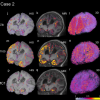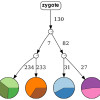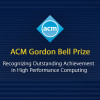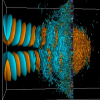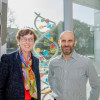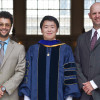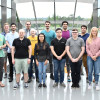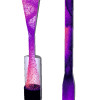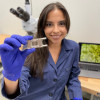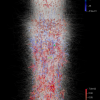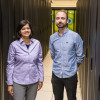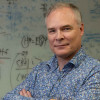News Center
Berkeley Lab’s Ushizima Honored with PMWC Pioneer Award
Berkeley Lab’s Daniela Ushizima was recognized with PMWC Pioneer Award for constructing “a new and reliable technique for diagnosing Alzheimer’s disease and measuring the efficacy of experimental treatments.” Read More »
The SciData Division’s Jean Luca Bez Receives BSSw Honorable Mention
Jean Luca Bez, a postdoctoral scholar in the Scientific Data Management Research (SDMR) group was recognized with an Honorable Mention by the Better Scientific Software (BSSw) Fellowship Program. Read More »
Bert de Jong Named 2023 Oppenheimer Fellow
Bert de Jong has been selected as a 2023 fellow of the Oppenheimer Science and Energy Leadership Program (OSELP). Read More »
Berkeley Lab’s Networking Middleware GASNet Turns 20
For 20 years, Berkeley Lab’s GASNet has been fueling developers’ ability to tap the power of massively parallel supercomputers more effectively. The middleware was recently upgraded to support exascale scientific applications. Read More »
HUNTRESS: A Step Forward for Computational Oncology Data Analysis
The latest developments in computational oncology are giving medical researchers a glimpse into a future where they’ll be able to understand tumor progression via supercomputers and advanced mathematical algorithms. Read More »
SCGSR Fellow Brings Astrophysics Data Skills to Berkeley Lab and Black Holes
Graduate student Peter Craig spent much of 2022 working with researchers in the Berkeley Lab Applied Mathematics and Computational Research division scouring through a new, massive astrophysics dataset looking for previously unidentified binary black holes. Read More »
Berkeley Lab-Led WarpX Project Key to 2022 Gordon Bell Prize
A Berkeley Lab research team and international collaborators were awarded the prestigious ACM Gordon Bell Prize on November 17 during SC22. Read More »
Stefan Wild to Lead Berkeley Lab’s Applied Mathematics and Computational Research Division
Stefan Wild has been selected to serve as the next director for Berkeley Lab's Applied Mathematics and Computational Research (AMCR) Division in the Computing Sciences Area (CSA). Read More »
Berkeley Lab Scientists Win IEEE LDAV Best Paper Award
Berkeley Lab scientists were honored with a Best Paper Award by the IEEE Large Scale Data Analysis and Visualization (LDAV) symposium. Their paper, Distributed Hierarchical Contour Trees, discusses their development of a powerful tool for data analysis. Read More »
Meet Helen Xu, 2022 Hopper Fellow
Helen Xu begins her role as Berkeley Lab’s new Grace Hopper Fellow. Established in 2015, this prestigious fellowship aims to develop young computer and computational scientists to make outstanding contributions to HPC applications. Read More »
Five CS Staff Honored With Berkeley Lab Director Achievement Awards
Five Computing Sciences Area employees will accept the Director’s Award for Exceptional Achievement at a ceremony on November 10. The CS Area award recipients are David Brown, Marcus Noack, Talita Perciano, Silvia Crivelli, and Michael Wehner. Read More »
Exabiome Brings Metagenomics Into the Exascale Era
Over the past seven years, the Berkeley Lab-led Exabiome project developed novel software tools that allow researchers to harness the power of cutting-edge high performance computers (and now exascale supercomputers) to solve previously infeasible problems in metagenomics. Read More »
GraphBLAST Targets GPU Graph Analytics Performance Issues
GraphBLAST, a new graph framework developed by researchers at Berkeley Lab and UC Davis, enhances the performance of the popular GraphBLAS collection of graph algorithm building blocks by overcoming design and performance challenges specific to graphical processing units (GPUs). Read More »
Berkeley Lab Researchers Honored with Best Paper Award at QCE22
For the third year running, Berkeley Lab researchers snagged the IEEE International Conference on Quantum Computing and Engineering (QCE22) Best Paper award. Read More »
Scientific Data Division Summer Students Tackle Data Privacy
Two students, Ammar Haydari and Nikhil Ravi, worked with Scientific Data Division's Sean Peisert on mobility data and electrical grid data privacy projects. Read More »
Neurodata Without Borders Team Co-Hosts Upcoming Data Showcase and Hackathon
Following up on their late June user meeting, Lawrence Berkeley National Lab’s (Berkeley Lab’s) Neurodata Without Borders (NWB) team is co-hosting several events geared toward training participants to generate new insights from existing open neurophysiology data through secondary analysis. Read More »
Exascale Application Project Targets Carbon Capture and Storage
Carbon capture and storage technologies are promising approaches for reducing CO2 emissions, but one of the biggest challenges in deploying them is the scale-up from laboratory design to industrial scale. The MFIX-Exa software subproject of the DOE’s Exascale Computing Project is helping achieve that scaling using the AMReX software framework developed at Berkeley Lab. Read More »
Optimizing SWAP Networks for Quantum Computing
Researchers at the Advanced Quantum Testbed (AQT) at Berkeley Lab, in partnership with the startup Super.tech (acquired by ColdQuanta), demonstrated how a smart compiler specifically tailored for superconducting hardware can optimize circuits and networks and execute less error-prone quantum algorithms such as Quantum Approximate Optimization Algorithm (QAOA). Read More »
A Former Berkeley Lab Intern Finds Her Place in Research
After working at Berkeley Lab as a Sustainable Research Pathways participant, Sofia Gomez realized she could have a career in research. Read More »
SRP Paves the Way for DOE Early Career Award
Professor Tanzima Islam credits her participation in the Sustainable Research Pathways at Berkeley Lab program with paving the way for her DOE Early Career Award. Read More »
Neuroscience Simulations Shed Light on Origins of Human Brain Recordings
A team of researchers at Berkeley Lab has found the origin of cortical surface electrical signals in the brain and discovered why the signals originate where they do. Read More »
Lavanya Ramakrishnan Presents at JSSPP and ESSA
In a keynote at the 25th annual Workshop on Job Scheduling Strategies for Parallel Processing, Lavanya Ramakrishnan explained that new workflow characteristics coming from data impact the design of next-generation infrastructure. Read More »
Bert de Jong Promoted to Editor of Computer Physics Communication
Bert de Jong, acting head of Berkeley Lab’s Computer Science Department, has been promoted to principal editor of Computer Physics Communications (CPC), an international journal and program library for computational physics and physical chemistry. Read More »
SRP Program Benefits UTEP Researchers in Materials Science and Beyond
Two summers participating in the Sustainable Research Pathways (SRP) program at Berkeley Lab produced academic “compound interest” for Jorge Muñoz, an assistant professor of physics at The University of Texas at El Paso, and his undergraduate research team. Read More »
Explaining Software Security in Scientific Computing
On the heels of co-authoring the NSF-sponsored "Guide to Securing Scientific Software," Berkeley Lab Senior Scientist Sean Peisert answers some questions about the current state of cybersecurity in science and beyond. Read More »









